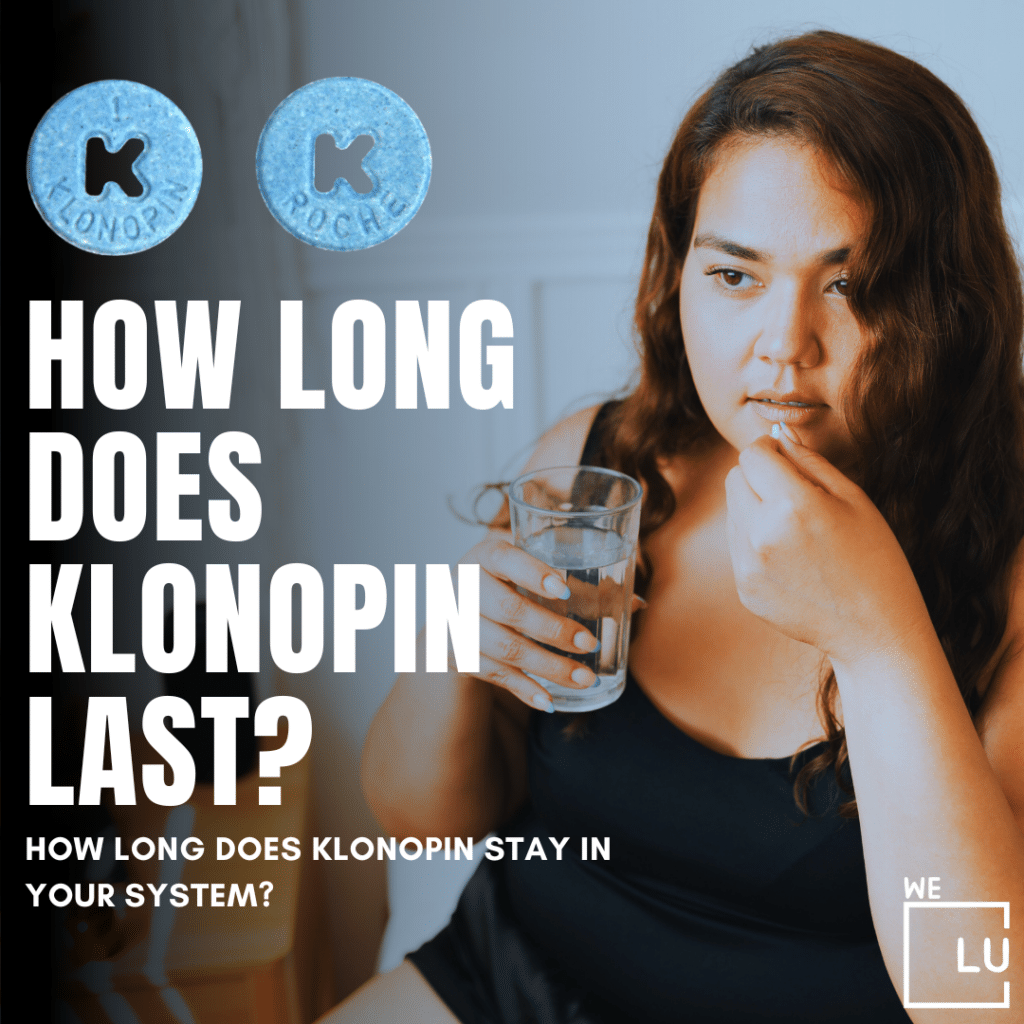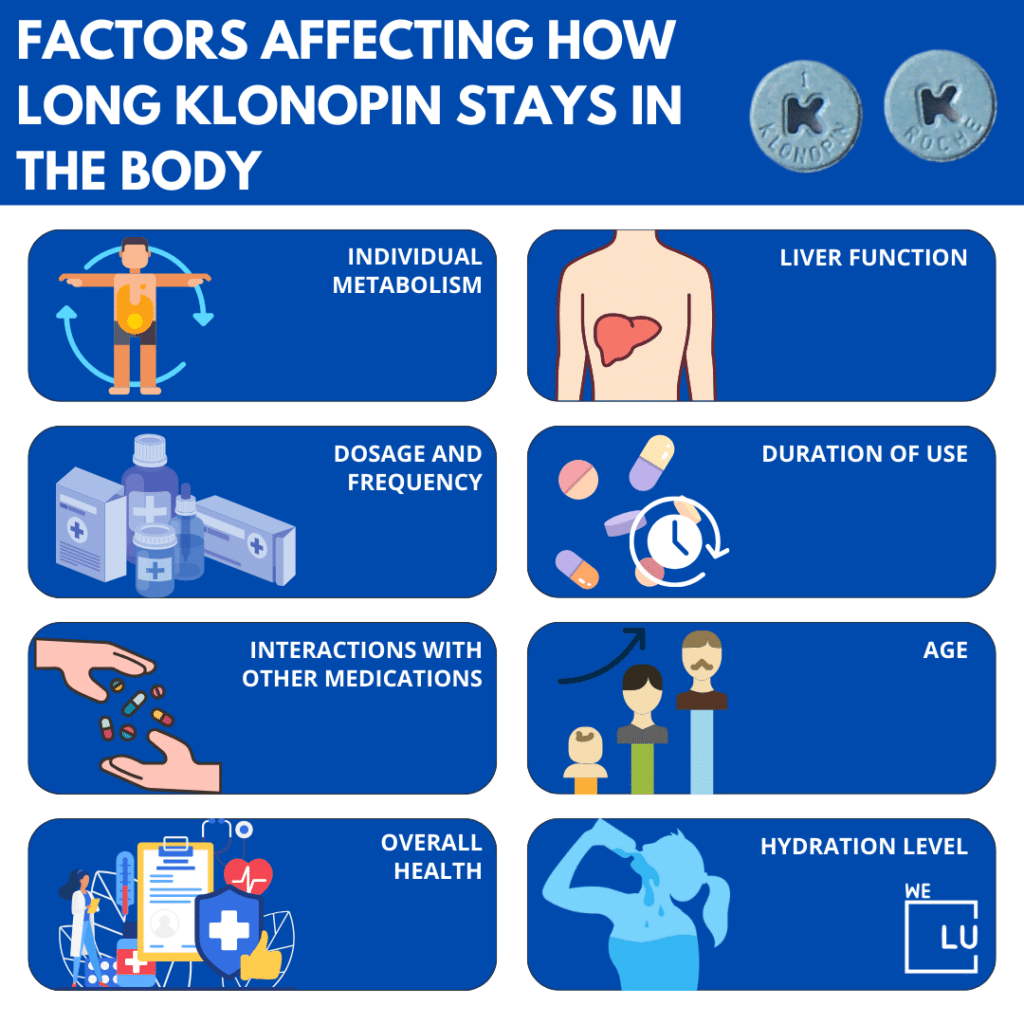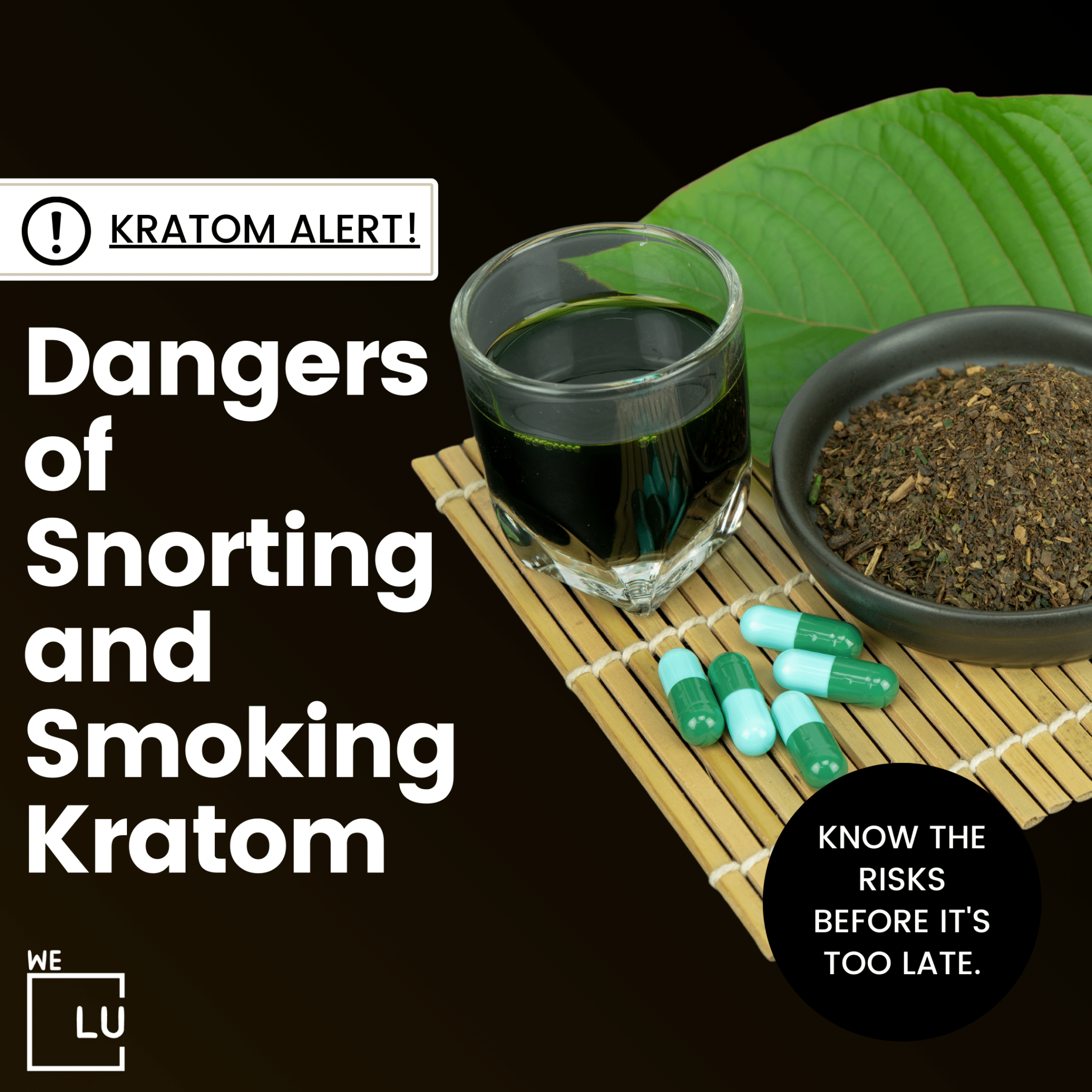How Long Does Klonopin Last?
Klonopin, the brand name for the generic drug clonazepam, is a medication classified as a benzodiazepine. Benzodiazepines are a class of psychoactive drugs known for their central nervous system depressant properties. Klonopin is prescribed for various medical conditions, primarily to address disorders related to anxiety and seizures. Klonopin enhances the effects of a neurotransmitter called gamma-aminobutyric acid (GABA), which has inhibitory effects on the brain, leading to a calming and soothing effect. While Klonopin can be beneficial for managing certain health conditions, its use requires careful consideration due to the potential for tolerance, dependence, and withdrawal symptoms.
How long does Klonopin stay in your system? The duration that Klonopin (clonazepam) remains in the system can vary among individuals due to metabolism, liver function, dosage, and other characteristics. Generally, it takes several half-lives for a drug to be mostly eliminated from the body.
Klonopin has a relatively long half-life compared to some other benzodiazepines, ranging from 18 to 50 hours, with an average of around 30 hours. This means that it can take several days for the drug to reach steady-state levels in the bloodstream, and it can linger in the body for an extended period.
As a rough estimate, it may take around 5 to 14 days for Klonopin to be mostly cleared from the system after discontinuation. However, individual variations can lead to differences in this timeframe.
Klonopin’s Long Half-life
The half-life of Klonopin is relatively long compared to some other benzodiazepines. The half-life of Klonopin typically ranges from 18 to 50 hours, with an average of around 30 hours.
This extended half-life means that Klonopin remains in the body for an extended period. This affects the dosage frequency and overall accumulation in the body.
Key points regarding Klonopin’s half-life:
- Extended Duration of Action: The long half-life contributes to the sustained therapeutic effects of Klonopin. This is one reason why it is often prescribed for conditions that require continuous or prolonged relief, such as certain anxiety disorders or seizure disorders.
- Steady-State Levels: It takes several days for Klonopin to reach steady-state levels in the bloodstream. A steady state is achieved when the amount of drug being ingested equals the amount being eliminated, resulting in a relatively constant concentration in the blood.
- Dosing Frequency: Due to its long half-life, Klonopin is usually taken once or twice daily. This is in contrast to shorter-acting benzodiazepines, which may require more frequent dosing throughout the day.
- Less Frequent Withdrawal Symptoms: The extended half-life of Klonopin may contribute to a smoother tapering process when discontinuing the medication, as it allows for a more gradual decrease in drug concentration in the body, potentially reducing the severity of withdrawal symptoms.
- Individual Variation: It’s important to note that individual factors, such as metabolism and liver function, can influence how long the drug remains in the body for a specific person. As a result, the actual duration of action may vary between individuals.
Despite its therapeutic benefits, the long half-life of Klonopin also contributes to its potential for tolerance, dependence, and withdrawal symptoms if not used as prescribed.
Individuals taking Klonopin should follow their healthcare provider’s instructions carefully and communicate any concerns or side effects. Abruptly stopping or changing the dose of Klonopin without medical supervision can lead to adverse effects. If there are questions or concerns about the medication, it’s advisable to consult with a healthcare professional.
Variables that Affect How Long Klonopin Stays in Your Body
Several factors affect how long Klonopin stays in the body, which include:
- Individual Metabolism: Metabolism varies from person to person. Genetic factors, age, and overall health can influence the rate at which the body breaks down and eliminates Klonopin. Individuals with faster metabolisms may process the drug more quickly than those with slower metabolisms.
- Liver Function: Klonopin is primarily metabolized in the liver. Liver function can impact how efficiently the body processes and eliminates the drug. Liver impairment may lead to a slower clearance of Klonopin.
- Dosage and Frequency: The dose and frequency of Klonopin administration can affect the drug’s accumulation in the body. Higher doses and more frequent use can lead to increased drug levels and a longer duration of action.
- Duration of Use: With prolonged use, Klonopin can accumulate in the body, affecting the time it takes for the drug to be eliminated. Chronic use may lead to a longer half-life due to the accumulation of the drug in tissues.
- Interactions with Other Medications: Other medications can influence the metabolism and elimination of Klonopin. Some drugs may inhibit or enhance the activity of the enzymes responsible for metabolizing Klonopin, leading to potential interactions.
- Age: Older individuals may metabolize drugs more slowly than younger individuals. This age-related difference can impact how long Klonopin stays in the system.
- Overall Health: General health, including factors such as kidney function, can affect eliminating drugs from the body. Impaired kidney function may result in slower clearance of Klonopin.
- Hydration Level: Adequate hydration is essential for proper kidney function, and the elimination of drugs often depends on renal clearance. Dehydration may impact the excretion of Klonopin.
Individuals taking Klonopin should provide a complete medical history, disclose all medications being taken, and report any changes in health or lifestyle. Such information helps healthcare professionals tailor the treatment plan and monitor for potential issues related to drug metabolism and elimination. Additionally, sudden changes to Klonopin dosage or discontinuation should be done under the guidance of a healthcare provider to avoid withdrawal symptoms.

Skip To:
Learn More:
- Is Klonopin Dangerous? Specifics, Dangers, Major Side Effects, Mood, Behavior, Detox & Treatment
- Klonopin Detox Importance, Process, Duration, Medications, Withdrawal, Dangers & Treatment
- Klonopin Vs Xanax, Differences, Effectiveness, Risks, Interactions & Potential for Addiction
- Klonopin, Abuse And Addiction, Side Effects, Withdrawal, Overdose & Detox Timeline
- Ativan Vs Xanax Difference & Similarity. Xanax vs Ativan Which is Stronger? Ativan Vs Xanax Which is Better, Safer & More Effective? Generic Lorazepam Vs Alprazolam Guide.
- Benzo Detox, Withdrawal Symptoms, Rehab & Aftercare
Looking for help with substance abuse challenges like Klonopin addiction? Join thousands of clients who trusted We Level Up CA for substance abuse treatments. Call 24/7 for more rehab information today. Your call is free and confidential.

Get Your Life Back
Find Hope & Recovery. Get Safe Comfortable Detox, Addiction Rehab & Dual Diagnosis High-Quality Care.
Hotline (855) 695-1160How Long Does Klonopin Stay In Your System Based on Dosage
The prescribed Klonopin dosage will affect how long Klonopin stays in your system. Remember that these are rough estimates, and individual factors can significantly influence these timelines.
| Dosage | Average Duration in the Body | Notes |
|---|---|---|
| Standard therapeutic dose (e.g., 0.5-2 mg per day) | 5 to 14 days | The average half-life is around 30 hours. |
| Higher therapeutic dose (e.g., 4 mg per day or more) | Longer than 14 days | Higher doses may result in increased accumulation and a more extended duration in the body. |
| Chronic use | Weeks to months | With prolonged use, Klonopin can accumulate, leading to an extended presence in the system. |
| Single or infrequent use | Up to 5 days | Even with a single dose, traces of the drug can be detectable for a few days. |
How long does 0.5 mg Klonopin stay in your system? How long does 1 mg Klonopin Stay in your system?
How long does 2mg of Klonopin stay in your system?
Again, these are general estimates, and individual factors such as metabolism, liver function, age, and overall health can influence the actual duration of Klonopin in the body. Additionally, drug tests may detect the presence of Klonopin or its metabolites for a more extended period than the drug’s therapeutic effects.
For accurate and personalized information, it’s crucial to consult with a healthcare professional who can consider individual health factors and provide guidance on the use and discontinuation of Klonopin.
Get Help. Get Better. Get Your Life Back.
Searching for an Accredited Drug and Alcohol Rehab Centers in Near You?
Even if you have failed previously and relapsed, or are in the middle of a difficult crisis, we stand ready to support you. Our trusted behavioral health specialists will not give up on you. When you feel ready or just want someone to speak to about therapy alternatives to change your life call us. Even if we cannot assist you, we will lead you to wherever you can get support. There is no obligation. Call our hotline today.
FREE Addiction Hotline – Call 24/7What is Klonopin Used for?
Klonopin is primarily used for the treatment of certain medical conditions, including:
- Anxiety Disorders: Klonopin is commonly prescribed for the management of various anxiety disorders, including generalized anxiety disorder (GAD). It helps alleviate symptoms of excessive worry, tension, and restlessness.
- Panic Disorder: Klonopin is effective in the treatment of panic disorder, a condition characterized by recurrent, unexpected panic attacks. It helps reduce the frequency and intensity of these attacks.
- Seizure Disorders: Clonazepam, the active ingredient in Klonopin, has anticonvulsant properties. It is used as an adjunctive therapy in the treatment of certain types of seizures, such as absence seizures and myoclonic seizures.
- Acute Mania and Bipolar Disorder: In some cases, Klonopin may be prescribed as an adjunctive treatment for acute mania associated with bipolar disorder. It can help manage symptoms of agitation and anxiety during manic episodes.
Klonopin is a benzodiazepine, a class of medications that act on the central nervous system to produce a calming effect. While it can be effective in treating the above conditions, its use is generally recommended for short-term relief due to the risk of tolerance, dependence, and withdrawal symptoms associated with long-term use.
Patients prescribed Klonopin should take the medication as directed by their healthcare provider and follow up regularly to assess its effectiveness and potential side effects. It’s crucial not to stop taking Klonopin abruptly, as this can lead to withdrawal symptoms. Any adjustments to the dosage or discontinuation of the medication should be made under the guidance of a healthcare professional.
How Long Does Klonopin Take to Peak?
Klonopin (clonazepam) is typically administered orally and is absorbed through the gastrointestinal tract. The time it takes for Klonopin to reach peak plasma concentrations, or peak levels in the bloodstream, can vary among individuals. However, in general, the onset of action for Klonopin is relatively rapid, with peak levels achieved within 1 to 4 hours after oral administration.
Several factors can influence the rate at which Klonopin reaches peak levels, including:
- Dosage: Higher doses may result in more rapid absorption and a quicker onset of action.
- Individual Variability: Factors such as metabolism, liver function, and overall health can vary among individuals, affecting the absorption and distribution of the drug.
- Food Intake: Taking Klonopin with food can slow absorption, potentially delaying the peak concentration.
While Klonopin reaches peak plasma concentrations relatively quickly, the full therapeutic effect may take some time to manifest. The calming and anxiolytic effects of Klonopin may continue to develop over days to weeks of consistent use.
Comfortable Facilities & Amenities
High-Quality Addiction & Mental Health Rehabilitation Treatment
Rehab Centers TourRenowned California Addiction Center. Serene Private Facilities. Inpatient rehab programs vary.
Addiction Helpline (855) 695-1160Proven recovery success experience, backed by a Team w/ History of:
15+
Years of Unified Experience
100s
5-Star Reviews Across Our Centers
10K
Recovery Success Stories Across Our Network
- Low Patient to Therapist Ratio
- Onsite Medical Detox Center
- Comprehensive Dual-Diagnosis Treatment
- Complimentary Family & Alumni Programs
- Coaching, Recovery & Personal Development Events

What are the Effects of Klonopin?
Like any medication, Klonopin can have both therapeutic effects and potential side effects. Individual responses to drugs can vary, and the following information is a general overview:
Therapeutic Effects:
- Anxiolytic (Anti-Anxiety) Properties: Klonopin is effective in reducing symptoms of anxiety and is often prescribed for generalized anxiety disorder (GAD) and other anxiety-related conditions.
- Anticonvulsant Properties: It is used to control certain types of seizures.
Common Side Effects:
- Drowsiness and Fatigue: Klonopin can cause drowsiness, and individuals may feel tired or lethargic.
- Dizziness: Some people may experience dizziness or lightheadedness, especially when standing up quickly.
- Impaired Coordination: Klonopin can affect motor skills and coordination.
- Memory and Concentration Issues: Benzodiazepines, including Klonopin, may cause short-term memory and concentration problems.
- Depression: In some cases, individuals may experience feelings of depression or mood changes.
Less Common Side Effects:
- Paradoxical Reactions: Some individuals may experience paradoxical reactions, such as increased anxiety or aggression.
- Gastrointestinal Issues: Nausea and gastrointestinal disturbances may occur.
- Withdrawal Symptoms: Abrupt discontinuation of Klonopin can lead to withdrawal symptoms, including rebound anxiety, insomnia, and tremors.
Long-Term Use and Risks:
- Tolerance and Dependence: Long-term use of benzodiazepines can lead to tolerance, meaning higher doses may be needed for the same effect, and physical dependence, where abrupt discontinuation can lead to withdrawal symptoms.
- Cognitive Impairment: Prolonged use of benzodiazepines has been associated with cognitive impairment, especially in the elderly.
Important Considerations:
- Use under Medical Supervision: Klonopin should only be used under the supervision of a healthcare professional who can monitor its effects and adjust the dosage as needed.
- Risk of Abuse: Benzodiazepines have the potential for abuse, and caution should be exercised, especially in individuals with a history of substance abuse.
- Interaction with Other Substances: Klonopin can interact with other medications and substances, potentially leading to adverse effects. It’s important to inform your healthcare provider about all medications and supplements you are taking.
If you have concerns about the use of Klonopin or are experiencing side effects, it’s crucial to consult with your healthcare provider. They can provide personalized guidance based on your medical history and individual needs.
World-class, Accredited, 5-Star Reviewed, Effective Addiction & Mental Health Programs. Complete Behavioral Health Inpatient Rehab, Detox plus Co-occuring Disorders Therapy.
CALL (855) 695-1160End the Addiction Pain. End the Emotional Rollercoaster. Get Your Life Back. Start Drug, Alcohol & Dual Diagnosis Mental Health Treatment Now. Get Free No-obligation Guidance by Substance Abuse Specialists Who Understand Addiction & Mental Health Recovery & Know How to Help.
Is Klonopin Addictive?
Yes, Klonopin (clonazepam) and other benzodiazepines have the potential for addiction and dependence. Klonopin is classified as a Schedule IV controlled substance in the United States, indicating that it has recognized medical uses but also a potential for abuse and dependence.
Here are some key points regarding the addictive potential of Klonopin:
- Benzodiazepine Dependence: Prolonged or high-dose use of Klonopin can lead to the development of physical dependence. Dependence occurs when the body becomes accustomed to the presence of the drug, and sudden discontinuation or a significant reduction in dosage can lead to withdrawal symptoms.
- Tolerance: With regular use, individuals may develop tolerance to the effects of Klonopin. This means that over time, higher doses may be required to achieve the same therapeutic effect.
- Abuse Potential: While Klonopin is generally prescribed for legitimate medical reasons, some individuals may misuse the drug for its calming or sedative effects. This can increase the risk of addiction.
- Withdrawal Symptoms: Abruptly stopping Klonopin after regular use can lead to withdrawal symptoms, including anxiety, insomnia, tremors, and seizures. Withdrawal should be managed under medical supervision to minimize the risk of complications.
- Risk Factors: Certain individuals may be at a higher risk of developing addiction, including those with a history of substance abuse or addiction, mental health conditions, or a tendency to engage in risk-taking behavior.
Use Klonopin precisely as directed by their healthcare provider. If there are concerns about dependence or addiction, these should be discussed openly with a healthcare professional. Additionally, healthcare providers often recommend a gradual tapering of the medication when discontinuing it to minimize the risk of withdrawal symptoms.
If you or someone you know is struggling with substance abuse or addiction, seeking help from healthcare professionals, counselors, or addiction specialists is essential. Addiction is a treatable condition, and support is available to assist individuals in overcoming it.
Learn more about Klonopin side effects, detox, and treatment here:
Experience Transformative Recovery at the We Level Up California Treatment Center.
See our authentic success stories. Get inspired. Get the help you deserve.



Start a New Life
Begin with a free call to an addiction & behavioral health treatment advisor. Learn more about our dual-diagnosis programs. The We Level Up treatment center network delivers recovery programs that vary by each treatment facility. Call to learn more.
- Personalized Care
- Caring Accountable Staff
- World-class Amenities
- Licensed & Accredited
- Renowned w/ 100s 5-Star Reviews
We’ll Call You
We Level Up CA Addiction, Detox & Mental Health Center Video
Search How Long Does Klonopin Stay in Your System, Drug & Alcohol Rehab / Detox & Mental Health Topics & Resources
Sources
- Food and Drug Administration. (FDA) (2017). Klonopin Tablets (clonazepam).
- National Alliance on Mental Illness. (2019). Clonazepam (Klonopin).
- Basit H, Kahwaji CI. Clonazepam. [Updated 2023 May 13]. In: StatPearls [Internet]. Treasure Island (FL): StatPearls Publishing; 2023 Jan-. Available from: https://www.ncbi.nlm.nih.gov/books/NBK556010/
- MedlinePlus. Clonazepam. https://medlineplus.gov/druginfo/meds/a682279.html
- We Level Up Treatment Center – ‘Benzo Addiction‘
- Bounds CG, Nelson VL. Benzodiazepines. [Updated 2023 Jan 7]. In: StatPearls [Internet]. Treasure Island (FL): StatPearls Publishing; 2023 Jan-. Available from: https://www.ncbi.nlm.nih.gov/books/NBK470159/
- Griffin CE 3rd, Kaye AM, Bueno FR, Kaye AD. Benzodiazepine pharmacology and central nervous system-mediated effects. Ochsner J. 2013 Summer;13(2):214-23. PMID: 23789008; PMCID: PMC3684331.
- Food and Drug Administration. (FDA). Benzodiazepine Drug Information. https://www.fda.gov/drugs/information-drug-class/benzodiazepine-drug-information
- Drug Enforcement Administration (DEA) – Benzodiazepines Drug Fact Sheet – https://www.dea.gov/sites/default/files/2020-06/Benzodiazepenes-2020_1.pdf
- Drug Enforcement Administration (DEA) – Benzodiazepines – https://www.deadiversion.usdoj.gov/drug_chem_info/benzo.pdf




